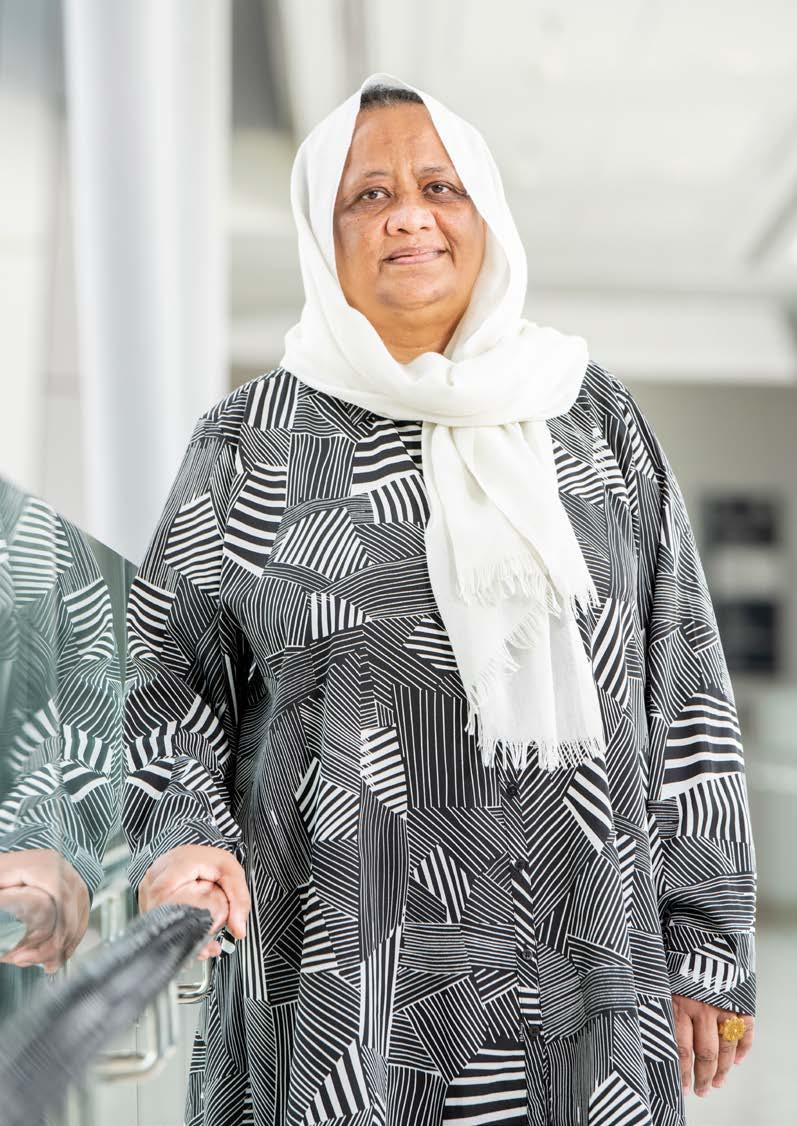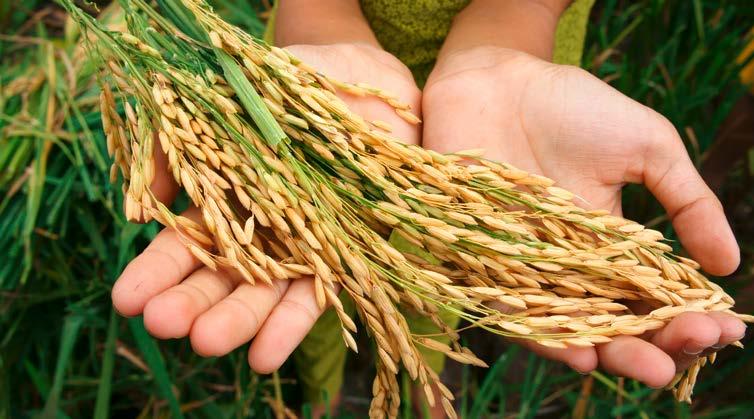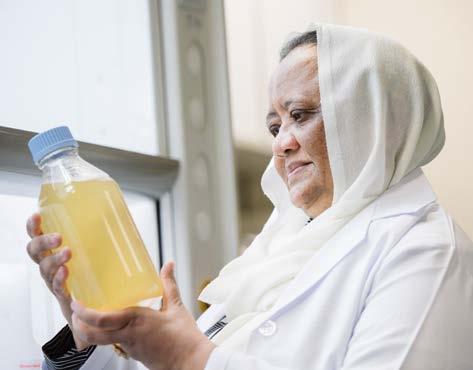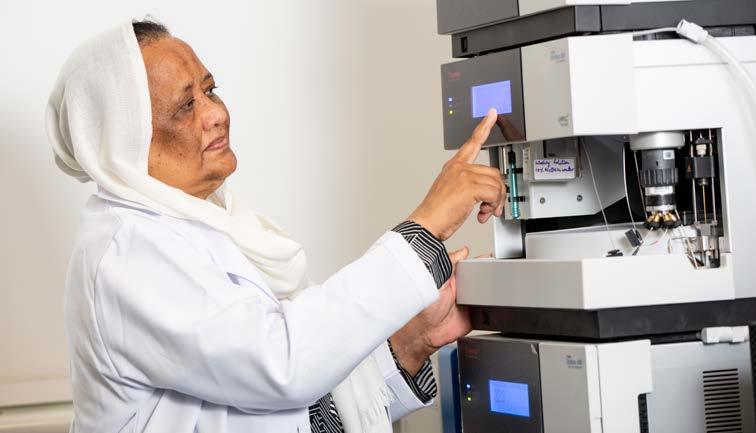
7 minute read
DR. AFAF KAMAL-ELDIN - ADVANCING FOOD CHEMISTRY TO SUPPORT UAE FOOD SECURITY
A question posed during Dr. Afaf Kamal-Eldin’s thesis defense set her on a research investigation that has spanned more than 20 years. At the end of it, she helped clarify the key mechanism in a type of vitamin E that has had a major impact on how this supplement functions as an antioxidant.
The year was 1993 and Dr. Afaf Kamal-Eldin, now chair of and a professor in the Department of Food Science at the United Arab Emirates University (UAEU), was a PhD student at the Swedish University of Agricultural Sciences (SLU) in Uppsala.
Advertisement
While defending her thesis on sesame oil, she was asked by her examiner why she had written that gamma-tocopherol was a more powerful antioxidant in vitro, while alpha-tocopherols were more powerful in vivo. Tocopherols are a category of organic compounds that include different forms of vitamin E. They act as antioxidants, scavenging free radicals to protect cells from oxidation damage. This antioxidant effect makes tocopherols useful as a food additive to reduce decay and rancidity and as a health supplement to prevent inflammatory conditions like cardiovascular disease, cancer, and arthritis.
However, why one type of tocopherol has a stronger antioxidant effect in living organisms (in vivo) while others work better in non-living things (in vitro), was a mystery.

“It was not known why this was the case, but I told the examiner that it must be due to a structural feature of the tocopherol molecule and completed my thesis defense. I had a six-month wait after graduating before starting my new job, and during that time, the examiner’s question kept nagging at me. So I immersed myself in research, reading everything I could find on the topic. The result of that reading was a review paper published in Lipids that has more than 2,100 citations today on Google Scholar,” she said.
While Dr. Kamal-Eldin’s paper was a huge success, it would take another 20-odd years and many more investigations before the question asked during her thesis defense would be definitively answered, as is often the case in fundamental or basic research.
Dr. Kamal-Eldin hopes her research into camel milk and dates will help the UAE achieve some of the goals of its National Food Security Strategy 2051, which aims to make the country the world leader in innovation-driven food security.
“The answer was that with tocopherol, its antioxidant activity relates not only to its ability to neutralize radicals but also to its partitioning in the food matrix, which is the nutrient and non-nutrient components of foods and their chemical bonds to each other. So depending on the structure of the matrix, a tocopherol could have more or less antioxidant activity," she shared.
The implication of this finding is that today, when scientists want to use tocopherol to preserve food or as a health supplement, they know to select alpha- or gamma-tocopherol, or a combination of both, along with other compounds, or synergists, that enhance the antioxidant activity.
“Our research, and that of others who followed, has enabled scientists to understand the basic principle so industry can tailor antioxidant strategies and add different compounds with an understanding of how this works,” Dr. Kamal-Eldin said.

This kind of single-minded pursuit of an answer to the question “why?” has been a defining aspect of Dr. Kamal-Eldin’s personality since she was a child in Sinnar, Sudan.
“My father was my role model. He always said you need to have a reason why you do anything. You can’t say you did it because everyone else did it. This put in me a drive from my childhood, to answer the question ‘why?’” she recalled.
Chemistry appealed to the young Dr. Kamal-Eldin because of its ability to answer so many of nature’s questions, leading her to study the subject for her Bachelor’s degree at the University of Khartoum. During her Master’s studies, she began to investigate the chemistry of sesame oil, which took her from pure chemistry to food chemistry. Later, when Dr. Kamal-Eldin was ready for her doctorate, she joined the SLU Department of Food Science, where she leveraged her previous years' of studies in biology and zoology to dive deeper into food chemistry.
After receiving her PhD in 1993, Dr. Kamal-Eldin stayed on at SLU as a postdoctoral researcher, moving up the ranks to become a professor in 1998. It was during her time at SLU that she began work on another one of her more notable projects. This one focused on the identification of biomarkers of whole grain cereal intake.
The project was inspired by industry’s need to develop a more accurate and objective way of measuring people’s intake of whole grains in its research to link whole grain consumption to good health. At the time, the standard way of doing this was to have subjects fill out questionnaires about their eating habits and then compare their reported whole grain consumption to their biometric health data. However, the self-reporting of daily intake was unreliable because of the potential for misreporting.
Dr. Kamal-Eldin and her collaborators first worked to establish a method that could distinguish whole grain from white flour in flours and processed foods. They identified that the lipid compound alkylresorcinol was present in bran and could be used as a biomarker for wheat and rye grains. They then analyzed how it was absorbed in the body to establish its absorption path, and they published a highly cited paper on this in Nutrition Reviews in 2004. The researchers then developed analytical methods to examine alkylresorcinols in urine and blood and compared subjects’ alkylresorcinol levels to their whole wheat consumption to confirm the correlation. This was detailed in another highly cited paper, published in The American Journal of Clinical Nutrition in 2008.
-Dr. Afaf Kamal-Eldin, Professor and Chair of the Department of Food Science United Arab Emirates University
“Now, whoever wants to link the health benefits of whole grains can use the alkylresorcinol biomarkers – either alone or in addition to the questionnaires. This provides a more objective way to link whole grain consumption to health. You cannot doubt results with a measurable biomarker,” Dr. Kamal-Eldin said, explaining the implications of her foundational work.
In 2010, Dr. Kamal-Eldin, seeking warmer climes, decided to move to the UAE, where she joined the UAEU as chair of and a professor in the Department of Food Science. There she pivoted her research to explore the untapped value of two traditional agricultural products – dates and camel milk. She seeks to identify the mechanism in camel milk responsible for its anti-diabetic effect, while also exploring how to utilize the fibrous byproduct of date syrup production as a food supplement. Dr. Kamal-Eldin hopes her research into camel milk and dates will help the UAE achieve some of the goals of its National Food Security Strategy 2051, which aims to make the country the world leader in innovation-driven food security.
“Food chemistry has a role in helping the UAE achieve its goal for food security with respect to the increasing quality – and even quantity – of the food produced in the country. I am particularly hoping to increase our utilization of our traditional produce of dates and camel milk, as they can be processed into different products with various functional and nutritional properties,” she shared.

This commitment to advancing the UAE’s food chemistry research has won her some recognition. In 2019, Dr. Kamal-Eldin was awarded a long-term “golden visa” by the UAE Government for her work in food composition and analysis, for which she was shortlisted for the Mohammed bin Rashid Medal for Scientific Excellence in 2018.
When asked for her opinion on the most important skills or qualities for future researchers to learn, Dr. Kamal-Eldin listed confidence, ethics, professionalism, and a thoughtful approach to their work that begins with study and contemplation. She believes imparting these skills to her students – who number in the thousands since she began teaching in 1993 – sets them up for long-term success.
“It is very important for me to contribute to the development of others. When I see my graduate students developing as researchers, it motivates me further. Some of my students are already professors in Sweden and Germany, and when I see their careers advancing, it makes me happy,” she stated.
Though the work of a fundamental scientist may not be as immediately impactful as an applied scientist, Dr. Kamal-Eldin says she measures her success by the students she has helped graduate – now totaling 19 PhD and 21 Master’s graduates – and the papers she has authored that have served as the base of other major investigations.
“I am happy when my research work becomes the base of other investigations. When I am retired, I will sit down and look into the progress of my students and the citations of my work to see how people have used it and what it has contributed to,” she concluded.






